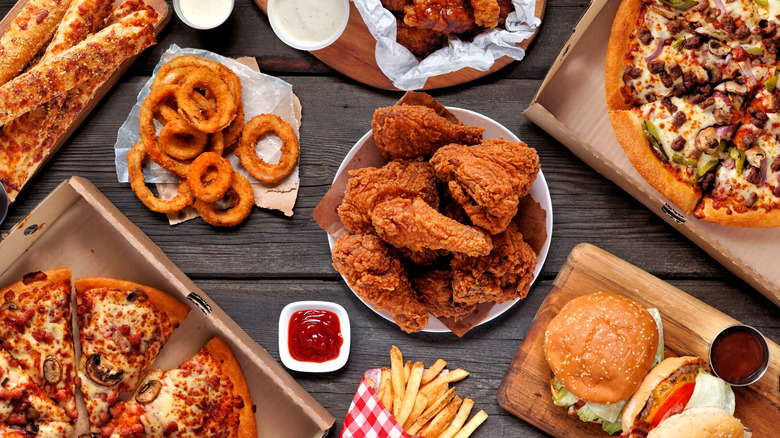A Study Outlined How Ultra-Processed Foods Are Linked To Cancer
In the United States, it is estimated that over 600,000 deaths will be the result of cancer in 2022, in addition to the nearly 1.9 million new cancer cases that will be diagnosed, according to the American Cancer Society. In 2020, cancer was the second leading cause of death for Americans, trailing only heart disease (per the CDC).
The most common forms in 2022 are breast cancer, prostate cancer, and lung cancer (via the National Cancer Institute). There are conscious health decisions you can make to reduce your risk of developing certain types. Choosing not to smoke or quitting outright can lower your chances of contracting or dying from lung cancer, per Johns Hopkins Medicine. Lifestyle changes like being physically active, limiting your alcohol intake, and maintaining a healthy weight can help decrease your risk of breast cancer (via Mayo Clinic).
Now, a study published in August 2022 has linked ultra-processed foods with a higher prevalence of colorectal cancer in men. This serves as yet another reminder that managing what we eat and limiting, or even eliminating, some foods from our diet is important, especially when factoring in one's health, family history, and other potential risks.
Watch what you eat
The BMJ study found that men who consumed high rates of ultra-processed foods had a 29% greater risk of developing colorectal cancer than those who ate the least ultra-processed foods (via Tufts University). In 2022, colorectal cancer is the third most common cancer diagnosed in men and the third leading cause of cancer-related deaths in men and women (via American Cancer Society).
According to Harvard Medical School, ultra-processed foods typically contain many added ingredients, such as sugar, salt, fat, and artificial preservatives. These foods can include pre-prepared frozen dinners, soda, hot dogs, cold cuts, packaged cookies, fast food, and salty snacks. The study also identified certain ultra-processed foods that can put both men and women at heightened risk of colorectal cancer. For men, meat, poultry, seafood-based ready-to-eat meals, and sugar-sweetened beverages were the worst offenders, whereas ready-to-eat and heat-mixed dishes were the main culprits increasing women's risk (per MedicalNewsToday).
While previous studies had examined processed foods' link to a higher risk of colorectal cancer, this was the first to investigate ultra-processed foods' connection. The comprehensive study involved more than 200,000 participants over the course of more than 25 years. Every four years, respondents' answers to questionnaires about their dietary intake and how often they consumed approximately 130 different foods were analyzed.
Although it found a clear link in men, the research did not discover a correlation between women eating higher amounts of ultra-processed foods and an increased overall risk of developing colorectal cancer.

